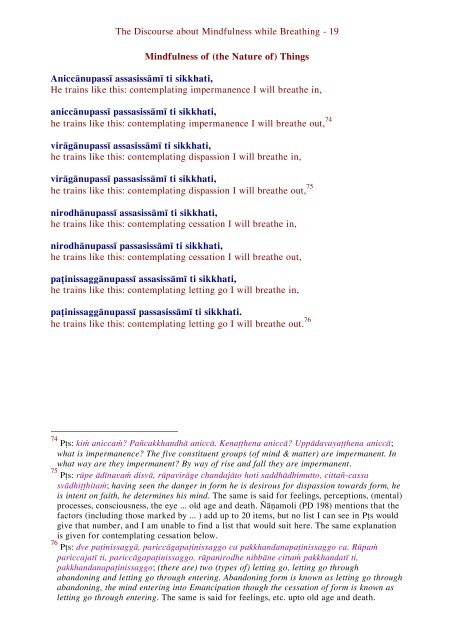Ānāpānasatisuttaṁ, The Discourse about Mindfulness while Breathing
A Pāli and English line by line (interlinear) version of this important discourse about the development of meditation while breathing (MN 118).
A Pāli and English line by line (interlinear) version of this important discourse about the development of meditation while breathing (MN 118).
You also want an ePaper? Increase the reach of your titles
YUMPU automatically turns print PDFs into web optimized ePapers that Google loves.
<strong>The</strong> <strong>Discourse</strong> <strong>about</strong> <strong>Mindfulness</strong> <strong>while</strong> <strong>Breathing</strong> - 19<br />
<strong>Mindfulness</strong> of (the Nature of) Things<br />
Aniccānupassī assasissāmī ti sikkhati,<br />
He trains like this: contemplating impermanence I will breathe in,<br />
aniccānupassī passasissāmī ti sikkhati,<br />
he trains like this: contemplating impermanence I will breathe out, 74<br />
virāgānupassī assasissāmī ti sikkhati,<br />
he trains like this: contemplating dispassion I will breathe in,<br />
virāgānupassī passasissāmī ti sikkhati,<br />
he trains like this: contemplating dispassion I will breathe out, 75<br />
nirodhānupassī assasissāmī ti sikkhati,<br />
he trains like this: contemplating cessation I will breathe in,<br />
nirodhānupassī passasissāmī ti sikkhati,<br />
he trains like this: contemplating cessation I will breathe out,<br />
paṭinissaggānupassī assasissāmī ti sikkhati,<br />
he trains like this: contemplating letting go I will breathe in,<br />
paṭinissaggānupassī passasissāmī ti sikkhati.<br />
he trains like this: contemplating letting go I will breathe out. 76<br />
74 Pṭs: kiṁ aniccaṁ? Pañcakkhandhā aniccā. Kenaṭṭhena aniccā? Uppādavayaṭṭhena aniccā;<br />
what is impermanence? <strong>The</strong> five constituent groups (of mind & matter) are impermanent. In<br />
what way are they impermanent? By way of rise and fall they are impermanent.<br />
75 Pṭs: rūpe ādīnavaṁ disvā, rūpavirāge chandajāto hoti saddhādhimutto, cittañ-cassa<br />
svādhiṭṭhitaṁ; having seen the danger in form he is desirous for dispassion towards form, he<br />
is intent on faith, he determines his mind. <strong>The</strong> same is said for feelings, perceptions, (mental)<br />
processes, consciousness, the eye ... old age and death. Ñāṇamoli (PD 198) mentions that the<br />
factors (including those marked by ... ) add up to 20 items, but no list I can see in Pṭs would<br />
give that number, and I am unable to find a list that would suit here. <strong>The</strong> same explanation<br />
is given for contemplating cessation below.<br />
76 Pṭs: dve paṭinissaggā, pariccāgapaṭinissaggo ca pakkhandanapaṭinissaggo ca. Rūpaṁ<br />
pariccajatī ti, pariccāgapaṭinissaggo, rūpanirodhe nibbāne cittaṁ pakkhandatī ti,<br />
pakkhandanapaṭinissaggo; (there are) two (types of) letting go, letting go through<br />
abandoning and letting go through entering. Abandoning form is known as letting go through<br />
abandoning, the mind entering into Emancipation though the cessation of form is known as<br />
letting go through entering. <strong>The</strong> same is said for feelings, etc. upto old age and death.


















